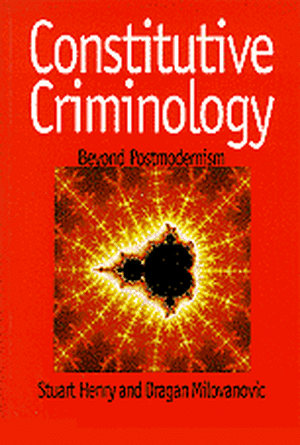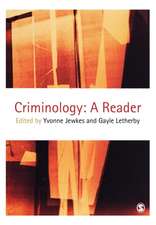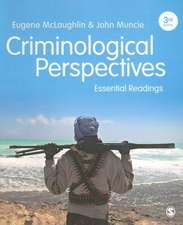Constitutive Criminology: Beyond Postmodernism
Autor Stuart Henry, Dragan Milovanovicen Limba Engleză Paperback – 20 dec 1995
Preț: 444.19 lei
Preț vechi: 522.57 lei
-15% Nou
Puncte Express: 666
Preț estimativ în valută:
85.01€ • 88.42$ • 70.18£
85.01€ • 88.42$ • 70.18£
Carte tipărită la comandă
Livrare economică 14-28 aprilie
Preluare comenzi: 021 569.72.76
Specificații
ISBN-13: 9780803975859
ISBN-10: 0803975856
Pagini: 304
Dimensiuni: 156 x 234 x 18 mm
Greutate: 0.45 kg
Ediția:1
Editura: SAGE Publications
Colecția Sage Publications Ltd
Locul publicării:London, United Kingdom
ISBN-10: 0803975856
Pagini: 304
Dimensiuni: 156 x 234 x 18 mm
Greutate: 0.45 kg
Ediția:1
Editura: SAGE Publications
Colecția Sage Publications Ltd
Locul publicării:London, United Kingdom
Recenzii
`Henry and Milovanovic's work is to be welcomed. It represents an ambitious attempt to reconstruct criminology through a sustained dialogue with intellectual traditions that, for too long, have remained at the margins of criminological inquiry.
The book consists of nine chapters each of which re-examines a particular aspect of criminology through the prism of contemporary theory. Conventional positions on human nature and behaviour, society and social order, the role of law, the definition of crime, crime causation, and justice policy and practice are each subjected to rigorous and sustained critique' - Criminal Behaviour and Mental Health
`This is in many ways an admirable and attractive book: admirable because it is a thorough-going attempt to reduce what many have seen as criminology's theoretical impoverishment by drawing on post-modern social theory and philosophy, attractive for its political radicalism and willingness, towards the end, to confront squarely issues of policy and practice' - LCCJ Newsletter
`Although such modernist concerns with social structure and crime are not rejected by the authors of Constitutive Criminology, they argue that crime must be deconstructed as a "recurrent discursive process" and "re-constructed to avoid re-occurrence" (p.xi). Drawing on postmodernism, semiotics, social constructionism, structuration and chaos theory, they aim neither to abandon modernism, nor completely embrace postmodernism, but to offer a new synthesis which goes "beyond the fragmentation of criminology" (p.xi). They acknowledge that the reader will encounter words, concepts and sentence constructions that encourage a suspension of "taken for granted" assumptions, while venturing into the unknown - thus the "journey will not always be smooth or comforting" (p.xiii).' Reviewing Sociology
`It is a challenging and demanding read that is well worth the time and energy required.... It is perhaps the most comprehensive (read as breadth rather than depth or as horizontal rather than vertical knowledge) book ever written on the subject of criminological theory and practice. No bodies of knowledge are left out, nothing is unaccounted for, including the "gaps" or "lacks" in scientific observations and measurements. This book covers all of the interterritorial bodies of criminological knowledge. In this regard, the book is without equal. As such, it should be required reading for academics and graduate students alike' - Social Pathology
'This book should become the focus of debate and discussion in the years ahead because it provides the basis upon which criminology can indeed be reformulated in new and imaginative ways....It challenges us to examine critically our assumptions about human subjects, the social world, crime and justice policies' - American Journal of Sociology
'The book is an imaginative, creative, challenging, provocative, and truly radical contribution to criminological theory.... This short review hardly does justice to the depth of analysis of Constitutive Criminology and to the many examples the authors use to clarify their arguments. To truly appreciate it, the book must be read and reread. This is cutting-edge analysis and Henry and Milanovic are to be congratulated for their scholarship and courage' - The Criminologist
`This is in many ways an admirable and attractive book: admirable because it is a thorough-going attempt to reduce what many have seen as criminology's theoretical impoverishment by drawing on post-modern social theory and philosophy, attractive for its political radicalism and willingness, towards the end, to confront squarely issues of policy and practice' - LCCJ Newsletter
`Although such modernist concerns with social structure and crime are not rejected by the authors of Constitutive Criminology, they argue that crime must be deconstructed as a "recurrent discursive process" and "re-constructed to avoid re-occurrence" (p.xi). Drawing on postmodernism, semiotics, social constructionism, structuration and chaos theory, they aim neither to abandon modernism, nor completely embrace postmodernism, but to offer a new synthesis which goes "beyond the fragmentation of criminology" (p.xi). They acknowledge that the reader will encounter words, concepts and sentence constructions that encourage a suspension of "taken for granted" assumptions, while venturing into the unknown - thus the "journey will not always be smooth or comforting" (p.xiii).' Reviewing Sociology
`It is a challenging and demanding read that is well worth the time and energy required.... It is perhaps the most comprehensive (read as breadth rather than depth or as horizontal rather than vertical knowledge) book ever written on the subject of criminological theory and practice. No bodies of knowledge are left out, nothing is unaccounted for, including the "gaps" or "lacks" in scientific observations and measurements. This book covers all of the interterritorial bodies of criminological knowledge. In this regard, the book is without equal. As such, it should be required reading for academics and graduate students alike' - Social Pathology
'This book should become the focus of debate and discussion in the years ahead because it provides the basis upon which criminology can indeed be reformulated in new and imaginative ways....It challenges us to examine critically our assumptions about human subjects, the social world, crime and justice policies' - American Journal of Sociology
'The book is an imaginative, creative, challenging, provocative, and truly radical contribution to criminological theory.... This short review hardly does justice to the depth of analysis of Constitutive Criminology and to the many examples the authors use to clarify their arguments. To truly appreciate it, the book must be read and reread. This is cutting-edge analysis and Henry and Milanovic are to be congratulated for their scholarship and courage' - The Criminologist
Cuprins
Introduction
`Here There Be Dragons'
Human Subjects and Human Behavior
On the Problem of Similarity and Difference
Society and Social Structure
Criminology's Visions of the House of Social (Dis)Order
The Structuring of Law
A Constitutive Socio-Legal Analysis
Definitions of Crime and Constructions of the Victim
Modernist Theories of Crime Causation
Postmodernist Approaches to Causality and the Constitution of Crime
The Justice Policy of Constitutive Criminology
Reconstruction through Replacement Discourse(s)
The Justice Practice of Constitutive Criminology
Replacing Technologies of Discipline with Languages of Possibility
`Here There Be Dragons'
Human Subjects and Human Behavior
On the Problem of Similarity and Difference
Society and Social Structure
Criminology's Visions of the House of Social (Dis)Order
The Structuring of Law
A Constitutive Socio-Legal Analysis
Definitions of Crime and Constructions of the Victim
Modernist Theories of Crime Causation
Postmodernist Approaches to Causality and the Constitution of Crime
The Justice Policy of Constitutive Criminology
Reconstruction through Replacement Discourse(s)
The Justice Practice of Constitutive Criminology
Replacing Technologies of Discipline with Languages of Possibility
Descriere
Taking as its starting point that individuals not only shape the world but are shaped by it, this book argues that the behaviours of those who offend and victimize others cannot be understood in isolation from the society of which they are a part.













